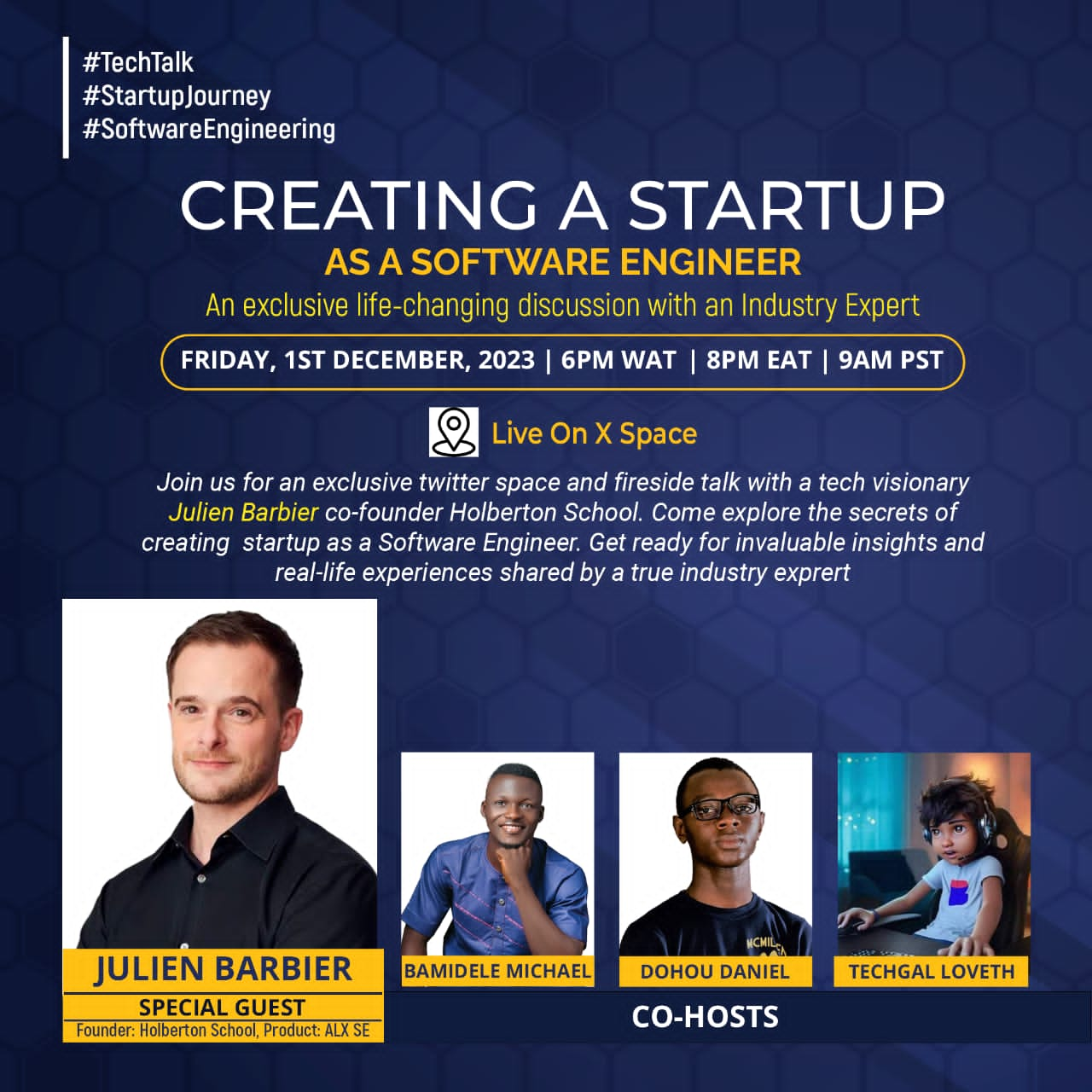Building A Startup As A Software Engineer: Insights from an X (Twitter) Space With Julien Barbier (#ALX_SE)
 Daniel Dohou
Daniel Dohou
Hi there 👋. If you're reading this, you're in the right place. Thank you for stopping by!
On the 1st of December 2023, Bamidele, Loveth and I had the pleasure of hosting Julien Barbier on an unrecorded X space, where he shared invaluable insights on creating a startup as a software engineer.
Julien Barbier is the CEO and Co-Founder of Holberton, an innovative Software Engineering School endorsed by tech leaders like Jeff Weiner and Jerry Yang. He is also the Product Officer at ALX Software Engineering.
On our X Space, our special guest spoke passionately about his experiences and the key principles that guide successful entrepreneurship in the tech industry. He also shared a key resource (click here 👈 to get it :)) that will be of major help while reading this blog.
This might be a lengthy read 🙄, but it's worth it.
Here's a summary distilling the essence of our X Space :).
Just Start Building 💪⚒
Julien emphasized the importance of taking the first step – Just Start Building. He urged aspiring entrepreneurs to focus on creating Minimum Viable Products (MVPs) to solve problems, validate ideas, and gain real-world feedback.
The first thing to do is to just start building. So step one is to start building so you get better ideas from it. You can build because you’re already a developer; it creates experience. And as you build, build with solving an actual problem in mind.
Key Takeaways:
Just start building and learn as you build, even if you do not have a complete idea of what you are doing. Even if you don't have a complete idea, the art of building itself leads to better ideas and invaluable experience.
Build your MVP to solve a real problem. This will help you a lot, especially as your experience with the real world increases as a developer or software engineer. Try solving existing difficulties with your idea and be passionate about it.
Work hard and Do Hard Things. If you don't like to work hard, don't start a company.
Focus on what matters — Just do one thing at a time instead of doing multiple things at once.
Have the right mindset while building!
Know who your users are, and what the user wants.
Find people who can support your journey: founders, co-founders, investors, and venture capitalists.
Don't worry too much about monetary benefits.
Gaining experience is about ups and downs, not ups only!
Learn From Experience ⏳
Drawing from his own experience, Julien recounted his accidental entry into entrepreneurship. His first startup was an accident, as it began with a simple website that garnered unexpected attention. Despite being so simple, they had lots of feedback and ratings that crushed their servers 🤯. Also, worth taking note of was the fact that Julien and his team had to create a company to protect themselves after having court issues without any funds. In a nutshell, his first company was created from a simple website!
Key Takeaways:
Julien's experience underscores the idea that you do not need a fully finished product before entering the market. Instead, learning from building and iterating is crucial.
Julien's words: “Find a real problem, then build a solution passionately! Building passionately and creatively will help you push forward, and that is because you will need to spend a lot of time, resources, and energy working on your solution.”
The whole lesson behind Julien's experience iterates on problem-solving. He, and his team, knew they were solving an actual ISSUE without knowing how big it was. The feedback from their users proves this.
Financial Considerations 💹💲
Key Takeaways:
Ask yourself if you need to raise money. This will help you reaffirm whether you need it. It depends on what you require, but most startup ideas do not need money to start. If you do, you can get a loan at the bank, or you could also borrow from family, friends, or people.
Append pertinently on what you need, avoiding irrelevant additions.
Talk to potential investors -> This will also permit you to gather more information about the field, potential competitors, and what investors expect to see before giving you money. This will help you perfect your approach to them and the market. Julien had several super interesting conversations while fundraising with Venture Capitalists, who did not invest, but challenged him instead! Indirectly, this helped him with his market strategy and ambition 😊.
Talk to people in any case, even if you think you understand :)
Ownership is much more important than money (the more money you collect from investors, the less ownership you have).
If you don't need money, DON'T TAKE IT!!!
The less capital you raise, the better it is and the more free you will be.
Building The Right Team 👨🏿🤝👨🏿
“A vision cannot be accomplished without the right set of people”, Julien remarked. Finding the right team is a process that requires patience. However, some significant things to look out for, and to take note of, if you consider choosing a suitable team of co-founders, board of directors, or the rest of a team are:
You require a team that possesses transparency, patience, passion, a growth mindset, and trust.
There must be no exception during recruiting; always focus on these qualities.
As a startup, the priority shouldn't be on the company yet, but rather on building a viable product, one that solves a need. Then through the journey of experience, you grow the skills and knowledge needed to choose your team.
Choosing Co-founders Wisely 🤔
When it comes to selecting co-founders, qualities such as skill set, passion, and a growth mindset are non-negotiable. Julien advised against having too many co-founders, as it can increase the risk of failure and conflicts.
Key Takeaways:
Everyone tells you it's better to have a co-founder. Necessarily, this is not the case. Especially when experienced, it's fine to do it alone. You do not have to have a co-founder. Having co-founders comes with a lot of advantages, but also a lot of challenges along the way. Choose wisely.
Implement a solid structure first for your start-up, before choosing co-founders! This can be implemented by making sure that everyone vests and signs a Vesting Contract, at least. This solves a majority of the problems with co-founders.
You need to put in a lot of work in selecting your cofounders, that is, if you need cofounders. You could also seek the advice of technical mentors.
Get to know your co-founders personally. Speak with them, and work with them frequently, before choosing them as co-founders. People find it hard to fake for a long time. So, if they’re hiding something, you’ll probably know.
There are key qualities that a potential co-founder must have: a growth mindset, the required skill sets, exemplary standards, and a passion that complements yours. You need to attract transparent people.
Avoid falling prey to a situation whereby “the paper of the person is good, but the mindset is not there”.
Always remember: Partnership is not friendship.
Energy and efforts should try to be matched by all the Co-founders. If not, try ending it at the beginning stages.
Before any major step, dialogue and communication are key. Communicate all the nitty gritty.
It’s risky to have a lot of co-founders, statistically and by human nature. The more the number of co-founders, the more the risk of failure. Many companies have failed severely because of this. Two (2) or three (3) co-founders are enough ideally.
In the event of a misunderstanding, threatening the future of your startup, do more research on the following:
Branding Vs Problem-Solving
While acknowledging the importance of branding, Julien highlighted that solving a real problem should take precedence over branding at the initial stages. Branding comes later; the primary focus should be on creating a product that addresses a genuine need.
Key Takeaways:
Branding is important, but the most important thing is your product. Do not focus on branding right away. Build a product that solves a problem, and sell the product to people (more from the Marketing For Hackers - Julien Barbier). From here, your visibility becomes organic based on needs met. Building a product that solves the problem is step one, but then, branding is more like step 10.
Branding depends majorly on your community of users: What they want and how they want it. You could improve your brand after receiving reviews from your users or you could also build logos based on the customers' votes.
Brand = Visual + Culture of the company
Failures In Startups
Julien shared valuable lessons from failures, emphasizing the importance of mindset. Viewing failure as a learning opportunity and persevering through challenges are essential qualities for an entrepreneur.
Key Takeaways:
Do whatever it takes not to fail; do the work :)
Always try until you find the solutions without excuses.
Your response to failures plays a critical role in your success. This mindset
shouldmust come first. Failure is not a good thing, but Mindset first! What differentiates you, as a startup, is how you see failures.
It's not about how you react to success; it's about how you react to FAILURES!
Entrepreneurship
Julien's Advice:
Everybody can, but not everyone needs to be or should be an entrepreneur. You don't have to be an entrepreneur to be successful. Understand who you are and what success is for you, and don’t listen to others. This is your life and starting a company is a big decision.
Honestly, entrepreneurship is almost not a choice. It comes to you. When you start obsessing about solving a product, you just start and become one by nature.
If you can't work hard, then you need a rethink :)
Quote Spotlights
It’s about you being the best version of you.
Do it because you love it: for the Passion :)
Conclusion
Our heartfelt thanks to Julien Barbier for generously sharing his startup wisdom during our enlightening X Space. Julien's emphasis on taking the first step and building passionately resonates deeply with aspiring entrepreneurs and software engineers. His passion for the success of all ALX SE Students is awe-inspiring.
As Sophia said,
"I want to make you succeed”. How can you not do your best (and then more) when you have such a mentor?"
Our ALX SE Learners, Aevy, Cobby, Patrick, Chinemerem, and other learners who shared their lessons during the X (Twitter) space, were instrumental to this blog 🥂. Our X Space host, and co-hosts (Bamidele and Loveth), are deeply appreciated for coordinating and facilitating the X (Twitter) space. Thank you, Lazolia, for co-editing this blog too.
Again, we extend our gratitude to Julien Barbier and ALX Africa for fostering an environment of learning and growth. May the entrepreneurial seeds planted continue to flourish, inspiring the next wave of innovators and leaders. Cheers to the journey of building startups and the limitless possibilities ahead!
What valuable lessons are you taking away from this write-up? Got any comments, or suggested edits? Leave us a comment below.
Thank you for reading 🤗. Don't forget to save this, and share too.
Learn more about Julien Barbier, and ALX Africa:
Subscribe to my newsletter
Read articles from Daniel Dohou directly inside your inbox. Subscribe to the newsletter, and don't miss out.
Written by

Daniel Dohou
Daniel Dohou
I am an upcoming Android Application Developer and Software Engineer. I Love Reading and Coding. I learn with @holbertonschool and @andela .